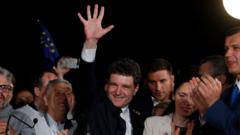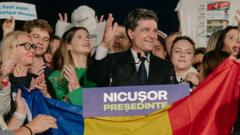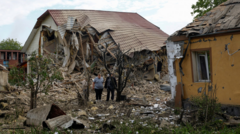In a coordinated effort to pressure Russia into peace talks regarding the ongoing war in Ukraine, the European Union defense and foreign ministers approved a new set of stringent sanctions targeting Moscow's covert oil operations. This decision comes just days after a senior EU official proposed even more rigorous restrictions, highlighting a commitment to intensifying economic pressure on President Vladimir V. Putin's administration. As uncertainty grows about the United States' future sanctions strategy under the Trump administration, EU nations are discussing options for an 18th sanctions package focused on vital energy and banking sectors.
EU Intensifies Economic Pressure on Russia Amid Ongoing Conflict

EU Intensifies Economic Pressure on Russia Amid Ongoing Conflict
The European Union aims to escalate sanctions against Russia's oil exports to encourage ceasefire negotiations in Ukraine.
On May 20, 2025, Brussels saw significant developments as the EU's defense and foreign ministers enacted new sanctions aimed at crippling Russia's covert oil exports, specifically addressing the dark market maneuvers conducted by its so-called shadow fleet of aging tankers. This latest set of sanctions represents the 17th round of economic penalties placed on Russia since its initial full-scale invasion of Ukraine in 2022, demonstrating an unwavering resolve from the EU.
"Our objective is to create conditions that compel Russia to seek peace," remarked Kaja Kallas, the EU's lead diplomat, emphasizing the need to amplify the economic toll on Russia. This aligns with comments made by Ursula von der Leyen, President of the European Commission, who indicated that officials are weighing more aggressive measures targeting gas pipelines and banks, in a bid to further diminish Russia's energy revenue.
The shift follows a recent conversation between President Trump and Putin, which dampened hopes for an immediate ceasefire. Determining the efficacy of EU sanctions and the potential involvement of the U.S. remains a priority, as Ukraine's President Volodymyr Zelensky expressed concerns regarding the ambiguity of American support in ramping up sanctions against Russia.
In the face of this evolving geopolitical landscape, the EU continues to refine its strategies, aiming for a nuanced approach that combines diplomatic pressure with substantial economic consequences to foster a return to negotiations for a peaceful resolution in Ukraine.
"Our objective is to create conditions that compel Russia to seek peace," remarked Kaja Kallas, the EU's lead diplomat, emphasizing the need to amplify the economic toll on Russia. This aligns with comments made by Ursula von der Leyen, President of the European Commission, who indicated that officials are weighing more aggressive measures targeting gas pipelines and banks, in a bid to further diminish Russia's energy revenue.
The shift follows a recent conversation between President Trump and Putin, which dampened hopes for an immediate ceasefire. Determining the efficacy of EU sanctions and the potential involvement of the U.S. remains a priority, as Ukraine's President Volodymyr Zelensky expressed concerns regarding the ambiguity of American support in ramping up sanctions against Russia.
In the face of this evolving geopolitical landscape, the EU continues to refine its strategies, aiming for a nuanced approach that combines diplomatic pressure with substantial economic consequences to foster a return to negotiations for a peaceful resolution in Ukraine.





















